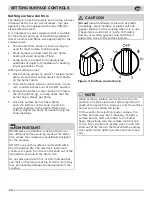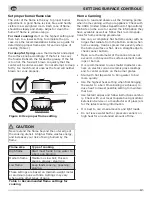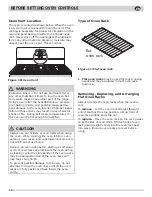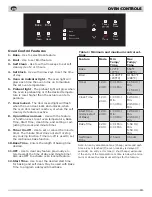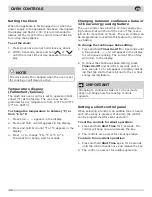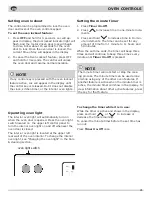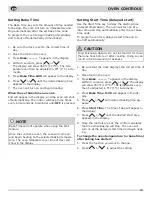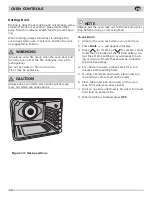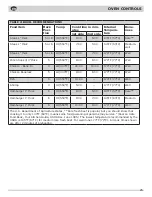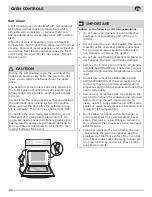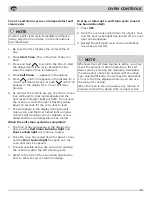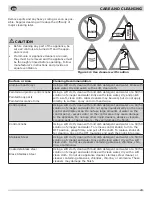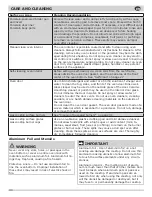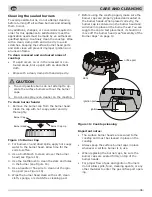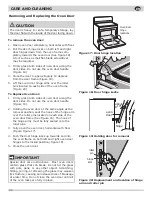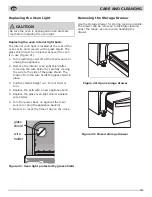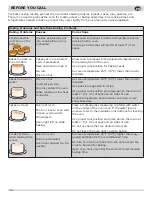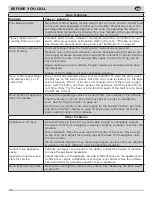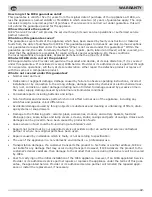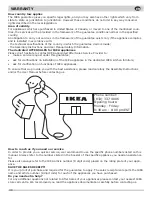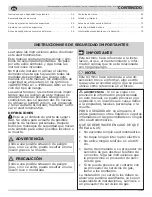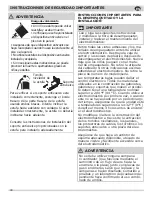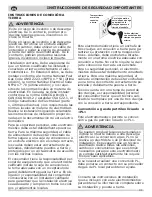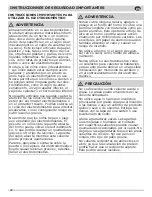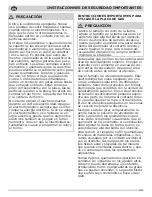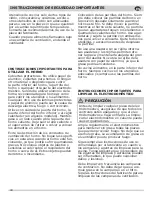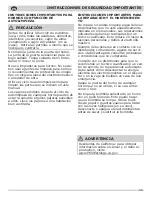
30
EN
CARE AND CLEANING
Surface or Area
Cleaning Recommendation
Porcelain-enameled broiler pan
and insert
Porcelain door liner
Porcelain body parts
Rinse with clean water and a damp cloth. Scrub gently with a soapy,
non-abrasive scouring pad to remove most spots. Rinse with a 50/50
solution of clean water and ammonia. If necessary, cover difficult spots
with an ammonia-soaked paper towel for 30 to 40 minutes. Rinse and
wipe dry with a clean cloth. Remove all cleaners or future heating
could damage the porcelain. Do not allow food spills with a high sugar
or acid content (milk, tomatoes, sauerkraut, fruit juices or pie filling)
to remain on porcelain surfaces. These spills may cause a dull spot
even after cleaning.
Manual clean oven interior
The oven interior is porcelain coated and safe to clean using oven
cleaners. Always follow manufacturer's instructions for cleaners. After
cleaning, remove any oven cleaner or the porcelain may become dam-
aged during future heating. Do not spray oven cleaner on any electri-
cal controls or switches. Do not spray or allow oven cleaner to build up
on the oven temperature sensing probe. Do not spray cleaner on oven
door trim, door gasket, plastic drawer glides, handles or any exterior
surfaces of the appliance.
Self-cleaning oven interior
Before setting a self-clean cycle, clean soils from the oven frame,
areas outside the oven door gasket, and the small area at the front
center of the oven bottom. See “Self Clean” on page 27.
Oven door
Use mild dish detergent and water or a 50/50 solution of vinegar and
water to clean the top, sides, and front of the oven door. Rinse well.
Glass cleaner may be used on the outside glass of the door. Ceramic
smoothtop cleaner or polish may be used on the interior door glass.
Do not immerse the door in water. Do not spray or allow water or
cleaners to enter the door vents. Do not use oven cleaners, cleaning
powders, or any harsh abrasive cleaning materials on the outside of
the oven door.
Do not clean the oven door gasket. The oven door gasket is made of a
woven material which is essential for a good seal. Do not rub, damage,
or remove this gasket.
Gas cooktop surface burners
See “Cleaning the sealed burners” on page 31.
Gas cooktop surface grates
Gas cooktop burner caps
Use a non-abrasive plastic scrubbing pad and mild abrasive cleanser.
Do not allow food spills with a high sugar or acid content (milk, to-
matoes, sauerkraut, fruit juices or pie filling) to remain on the burner
grates or burner caps. These spills may cause a dull spot even after
cleaning. Clean these spills as soon as surfaces are cool. Thoroughly
dry immediately following cleaning.
Aluminum Foil and Utensils
WARNING
Never cover any slots, holes, or passages in the
oven bottom or cover an entire oven rack with
materials such as aluminum foil. Aluminum foil lin-
ings may trap heat, causing a fire hazard.
Protective Liners — Do not use aluminum foil to
line the oven bottom. Improper installation of
these liners may result in risk of electric shock or
fire.
IMpORTANT
Aluminum foil - Use of aluminum foil on a hot
cooktop can damage the cooktop. Do not use thin
aluminum cooking utensils or allow aluminum foil
to touch the surface elements under any circum-
stances.
Aluminum utensils - The melting point of alumi-
num is much lower than that of other metals. Care
must be taken when aluminum pots or pans are
used on the cooktop. If aluminum pans are al-
lowed to boil dry when using the cooktop, not only
will the utensil be damaged or destroyed, but it
may fuse to or permanently damage the cooktop.
Summary of Contents for MOTSVARIG
Page 1: ...ES FR EN MOTSVARIG ...
Page 111: ......
Page 112: ...A17725613 A March 2020 Inter IKEA System B V 2020 23430 AA 2195063 2 ...

